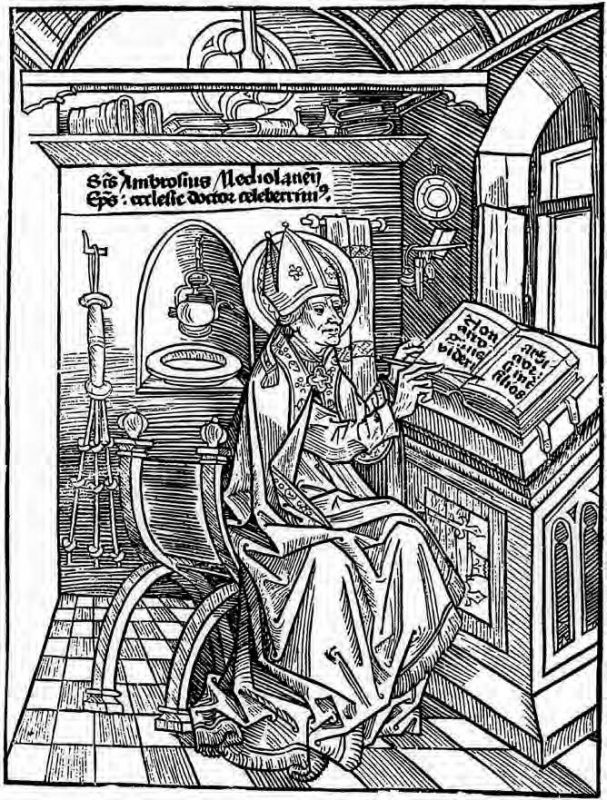(Anonymous woodcut of Ambrose in his study, from a 1492 collection of his works, courtesy of Wikimedia Commons)
Daily Office Readings for the feast Day of Ambrose of Milan, December 7, 2018:
One of those quasi-theological sayings that makes the rounds on social media every now and then,, attributed to no one in particular, goes like this: “God doesn’t call the equipped, God equips the called.” Ambrose of Milan might be the poster child for that meme!
Ambrose’s background was not in theology–he had studied literature, law, and rhetoric as a young man, and had devoted himself to a life of Roman public service, eventually becoming governor of Liguria and Emilia, with the headquarters of the government of both provinces being Milan. He was a trusted figure in government circles, which would serve him well.
By 374, a deep rift was developing among Christians in Milan. The Bishop of Milan, Auxentius was an Arian–but Christians in Milan were split about 50-50 between the Arians and the Athanasians (who followed the Nicene Creed). It’s important to remember that although the first Council of Nicea affirmed the Athanasian view and rejected the Arian view in 325, there were still a number of years that Arians and Athanasians coexisted (uneasily) in the Western Church, and it would take more ecumenical councils to totally repudiate Arianism.
When Auxentius died, it was a recipe for disaster, because both sides had a vested interest in who would succeed him. Ambrose simply showed up hoping to prevent a riot. When he arrived, to his surprise the crowd started yelling “Ambrose, bishop!” Although Ambrose was Athanasian in his belief, he was a favorite of Athanasians and Arians alike because he was known to be kind and charitable to the Arians, despite these very serious fundamental differences in belief. Ambrose quickly refused–because not only was he not a theologian, he wasn’t baptized!
Ambrose then did what many of us might do if we found ourselves in over our head–he quickly hid at a friend’s house. His friend, however, eventually ratted him out, and Ambrose was subsequently baptized and consecrated as the Bishop of Milan. Ambrose wasted no time getting up to speed theologically, and discovered his knowledge of Greek–an unusual skill in that locale at that time–gave him unique insight into Scripture. It was enough to impress a young Augustine of Hippo, who converted to Christianity on account of Ambrose’s knowledge of not only theology, but rhetoric. It was also enough to allow Ambrose to grow into the security of his understanding of his faith–and to be the defender of what would prove to be orthodoxy. Even when the Arians gained strength and imperial favor, Ambrose was willing to risk death, even barricading himself with the congregation of an Athanasian church in Milan until the imperial order to take it was rescinded.
When Ambrose wasn’t busy defending the Nicene creedal faith, he also contributed to the church’s liturgy and music. A hallmark of Ambrose’s liturgics was to avoid rigidity and false conflicts about liturgical form, and instead leave a little wiggle room for local customs and practices–a tradition our own rubrics in the Book of Common Prayer continue today. He was the first to develop what we would now call antiphonal chant, recognizing that the theology we sing to one another in Psalms and hymns spoke to us in a different way than preaching.
In short, for a guy not equipped for the job, and who didn’t want it at first, it all worked out pretty well, and we owe much to Ambrose. Perhaps in a world where we are presently struggling with fundamental differences in our secular beliefs, as well as religious ones, he still has much to offer. He didn’t fight Arianism with threats and violence, but instead relied on his eloquent preaching and teaching–and when that didn’t work, he simply stayed put and refused to give in.
How might Ambrose’s life teach us to live in the tension of the vast differences of opinion we navigate in today’s conflicted world, or when we feel over our heads in what we perceive as God’s call?
Maria Evans splits her week between being a pathologist and laboratory director in Kirksville, MO, and gratefully serving in the Episcopal Diocese of Missouri . She presently serves as Interim Assistant Priest at two churches, Church of the Good Shepherd in Town and Country, MO, and St. Luke’s Episcopal Church in Manchester, MO, as they explore a shared ministry model.

